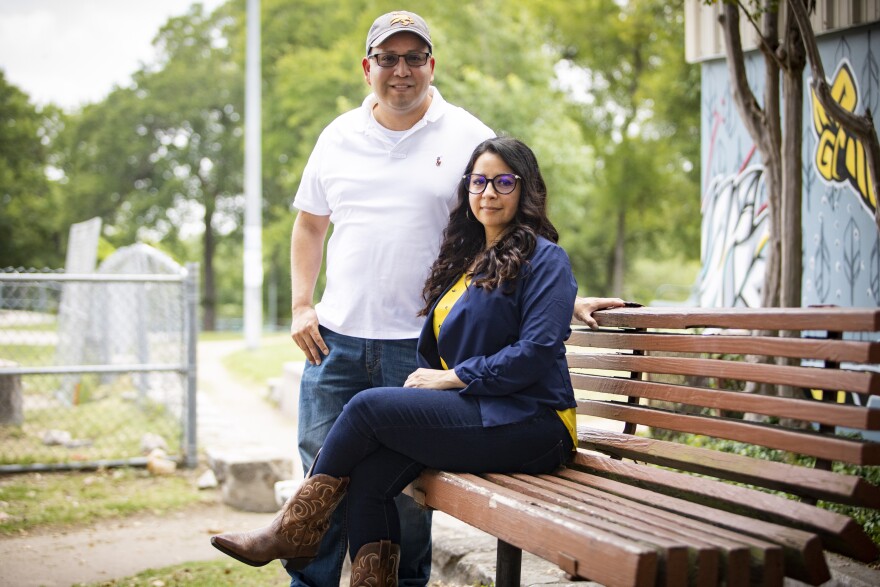As COVID-19 tears through Austin’s Latino community, a local couple is working to find ways to keep Latinos at home as much as possible.
Diana Anzaldua and Jason Rubio say the pandemic never really felt as dire as it does right now.
“It didn’t feel as personal to us because no one we knew really had it,” Rubio said. “So it was kind of a foreign thing.”
But in the past several weeks, infection rates among Latinos have been skyrocketing.
Latinos make up more than 60% of COVID-19 cases in the Austin area, according to the data available to public health officials. This population is also twice as likely to be hospitalized for the disease.
Rubio said it kind of snuck up on him.
“Here we are now in July and a lot of people that we know are getting COVID, and they are sick with it,” he said. “We know people who are now in the hospital because of it. And it’s like, wow, this is really a problem.”
Anzaldua says now the pandemic has become personal.
“We personally identify with this community,” she said. “We are Latinx. We are Hispanic. We identify with this community.”
Essential Workers
The couple started thinking about what specific problems they could solve for Latinos in Austin.
One of the biggest issues they saw is that a lot of Latinos aren’t able to stay at home as much as other groups. Public health experts have said that’s mainly because Latinos make up a huge chunk of the city’s essential workforce.
Dr. Jewel Mullen, the associate dean for health equity at UT Austin’s Dell Medical School, said less than 20% of Latinos can work from home.
RELATED | Watch: A Dell Med Professor Answers Your Questions About COVID-19 Health Care Disparities
“We know that many of the workers who have continued to work out of their homes – who couldn’t telework, who couldn’t stay home – are from Latinx communities,” she said.
Mullen said this a community doing a lot of the work that most of us are relying on right now.
“[They’re] not just people who are construction workers,” she said. “[They’re] people who work in nursing homes, people who are nurses, people who work in transportation, people who work in child care.”
'There's no Spanish Favor or Spanish Instacart'
And when they are not working, there’s another hurdle that prevents Latinos from staying home as much as possible.
Rubio said he found out that app services that allow people to get things like groceries brought to them are just not as accessible for Latinos.
“I did some research and realized that there are no Spanish language services for them,” Rubio said. “I think Uber and Lyft do offer Spanish language, but there’s no Spanish Favor or Spanish Instacart – or any of that stuff.”
"We realized a lot of [Spanish-speaking] people are on Facebook. Let's reach them where they are."
So, Rubio and Anzaldua came up with a plan. They created a Facebook group a few days ago. It’s called AYUDA, which means “help” in Spanish.
“The goal is for people to join so that when someone has a need, they can go on there and say, ‘Hey, I need whatever it is – whether it’s someone to pick up my meds at Walmart or Walgreens,’” he said. “And someone can go ahead and do that.”
Rubio said this also allows both parties to figure out payment amongst themselves, which will make sure all the money goes to the driver. He says apps can charge drivers up to 25% of the fees. But with AYUDA, the drivers make all the money, which he says will help some of the Latinos in Austin who have lost jobs during the pandemic.
And there’s a reason Rubio and Anzaldua chose to make a Facebook group instead of an app. They say most of the service apps are not geared toward Spanish speakers, so Latinos don’t often seek out help in an app store.
Rubio said he did know, however, that a lot of Latinos are already on Facebook.
“They communicate on Facebook,” he said. “Just through the business that we run, we get a lot of Spanish-speaking people who will email us or message us from Facebook. We realized a lot of these people are on Facebook. Let’s reach them where they are.”
Rubio says AYUDA gives Latinos more opportunities to stay at home and socially distance.
It also gives the Latino community access to contactless support, Anzaldua said, which so many English-speaking Austinites already have easy access to.
“[It’s] very similar to Runner City that we have here in Austin,” she said. “But Runner City does not serve Spanish-speaking consumers. It is only focused on English language requests. So this is a huge need for us here in Austin. And we are seeing that.”
Latinos Helping Latinos
And there’s another big problem the AYUDA Facebook group seeks to solve.
Rubio, whose day job is teaching, said he knows many members of the Latino community won’t seek out help from government services. So, he says, help is going to have to come from members of the community.
“A lot of the times they won’t reach out to these public services or go to even get tested,” Rubio said. “Because they are like, ‘Well what if they ask for my immigration status and papers, things like that.’ I work with a lot of students who their parents are from Mexico or other places. And so this is real for us. They tell us what they are experiencing and the fears that are out there.”
"The Latinx population in Austin is diverse. So, working with community organizations who know community members who can be those brokers of trust and safety would be really key."
Fears of deportation or having an immigration status affected by using government services is a huge issue for Latino families who need help. It’s also a hurdle for city leaders hoping to address what’s happening in the Latino community. Mullen said that’s why city leaders will eventually have to work with organizations formed within a community to tackle this crisis.
“The Latinx population in Austin is diverse,” she said. “So, working with community organizations who know community members who can be those brokers of trust and safety would be really key.”
AYUDA is currently getting off the ground. Anzaldua and Rubio say they are working to get the word out in local Spanish language media.
And as city leaders struggle to respond to what’s happening in their community, the couple says they hope AYUDA provides at least some needed help right now.
Got a tip? Email Ashley Lopez at alopez@kut.org. Follow her on Twitter @AshLopezRadio.
If you found the reporting above valuable, please consider making a donation to support it. Your gift pays for everything you find on KUT.org. Thanks for donating today.






